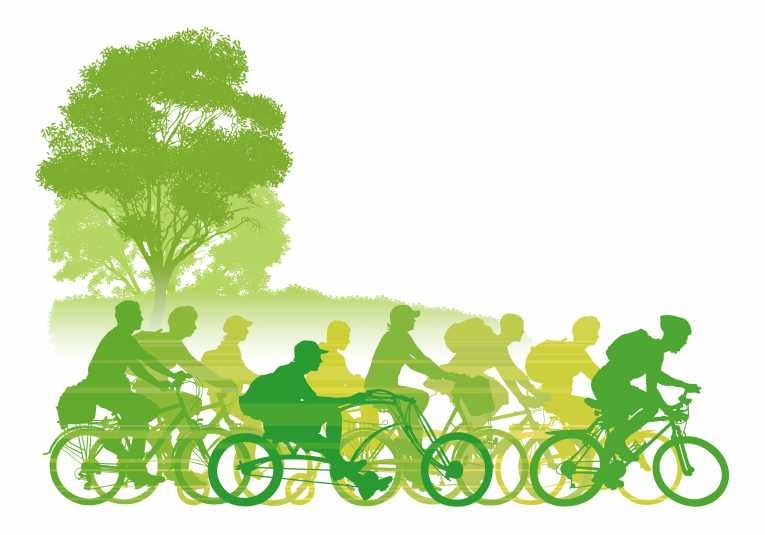What is Sustainable Transport?
Sustainable Transport is sometimes known as Green Transport and it is any form of transport that does not use or rely on dwindling natural resources. Instead it relies on renewable or regenerated energy rather than fossil fuels that have a finite life expectancy. For this reason it is said to have a low or a negative effect on the environment since it makes use of energy sources that are sustainable.
Walking, cycling and sailing are excellent examples of sustainable transport.
A fuel-hungry world
Until relatively recent times very little consideration was given to the sustainable sources of energy for transport, or for the efficient use of clean fuels. In many parts of the developing world this is still the case and high levels of pollution continue to be tolerated.
It is estimated that every year various forms of transport consume between 20% and 25% of the world's energy and this significantly contributes to the increasingly high levels of greenhouse gases that continue to be released into the atmosphere.
Information about greenhouse gases (GHGs).
It can't last forever
There are now around 750 million cars in the world and predictions are that if the present trend continues, the number will double in the next 30 years. All but a very few are powered by petroleum-based fuel.
In 1900 there were just a few thousand cars in the world but as numbers increased, so did the demand for oil. Estimates suggest that during the 20thcentury about half of the world's accessible oil deposits were used up.
It is only relatively recently that people began to be concerned about future oil supplies. A combination of political unrest in major oil producing areas like the Middle East, combined with the fact that reserves are running out in areas such as the US, has heightened this concern and had the combined effect of focusing the mind on seeking alternative energy sources, and pushing up prices.
Added to that, during the last few years people have simply become more environmentally conscious. Whereas before, in many people's eyes the resources of the world were simply there to be made use of, there is now an almost universal appreciation of the fact that the world's resources will not last for ever and that once they are gone they are gone for good.
Information about world fossil fuel reserves.
What are the alternatives?
In many areas there have been moves to encourage people to use public transport networks rather than travelling by car. Cycling has also gained in popularity, both as a means of maintaining fitness, but also because it is a cheap and often swift form of transport.
There have been moves to introduce cleaner and more fuel-efficient means of urban transport. There have been experiments using different types of fuel and there has been much effort and progress made in the development of so-called ''green vehicles''.
Hybrid vehicles have been developed as an alternative to conventional cars. These are gaining in popularity. Generally they are of a hybrid design, combining an internal combustion engine with an electric engine. Other vehicles run on natural gas and some are electrically powered.
Hybrid electric vehicle (HEV).
Biofuel: Biofuels have also become very popular in some areas. Bioethanol is made by fermenting plant materials and biodiesel is made from vegetable oils, animal fats or recycled grease. In 2008 biofuels provided 1.8% of the world's transport fuel. One of the problems is that bioethanol production relies on the cultivation of large amounts of plant material often on land that was formally tropical rain forest, or on land that would otherwise have been used to produce food.
Solar power is another possible future option, but this will depend on a technical leap in the conversion rates of the photovoltaic (PV) cells that convert sunlight into electricity. Battery power would be required at nighttime or when there was no sun during daylight periods.
More detail on solar powered cars and solar transportation as a method of sustainable transport.
Hydrogen can be used to power future transportation. This might in fact be the power of the future because hydrogen is the most common element in the Universe. Power can either be through the use of electric motors powered by fuel cell technology or by improved internal combustion engines. In both cases emissions would be zero. Hydrogen power is currently prohibitively expensive, but progress is being made in the technology to achieve this. A big challenge is to source the hydrogen from renewable resources. Honda has produced the first 'commercial' hydrogen powered vehicle in the form of the Honda FCX Clarity, although this has limited availability.
Nuclear power was once advocated as the clean alternative to coal, oil and gas for generating electricity and for producing hydrogen through electrolysis. A number of accidents at nuclear plants, together with the inherent problem of dealing with large amounts of radioactive waste, has led many countries to reconsider this method of power generation.
Looking to the future
Transport is a vital part of our everyday life. The prevailing 20thcentury view was to rely on fossil fuels for most of our transport needs and to ignore any consequences. In the 21stcentury we have woken up to the fact that there is a need for us to care for the world around us.










